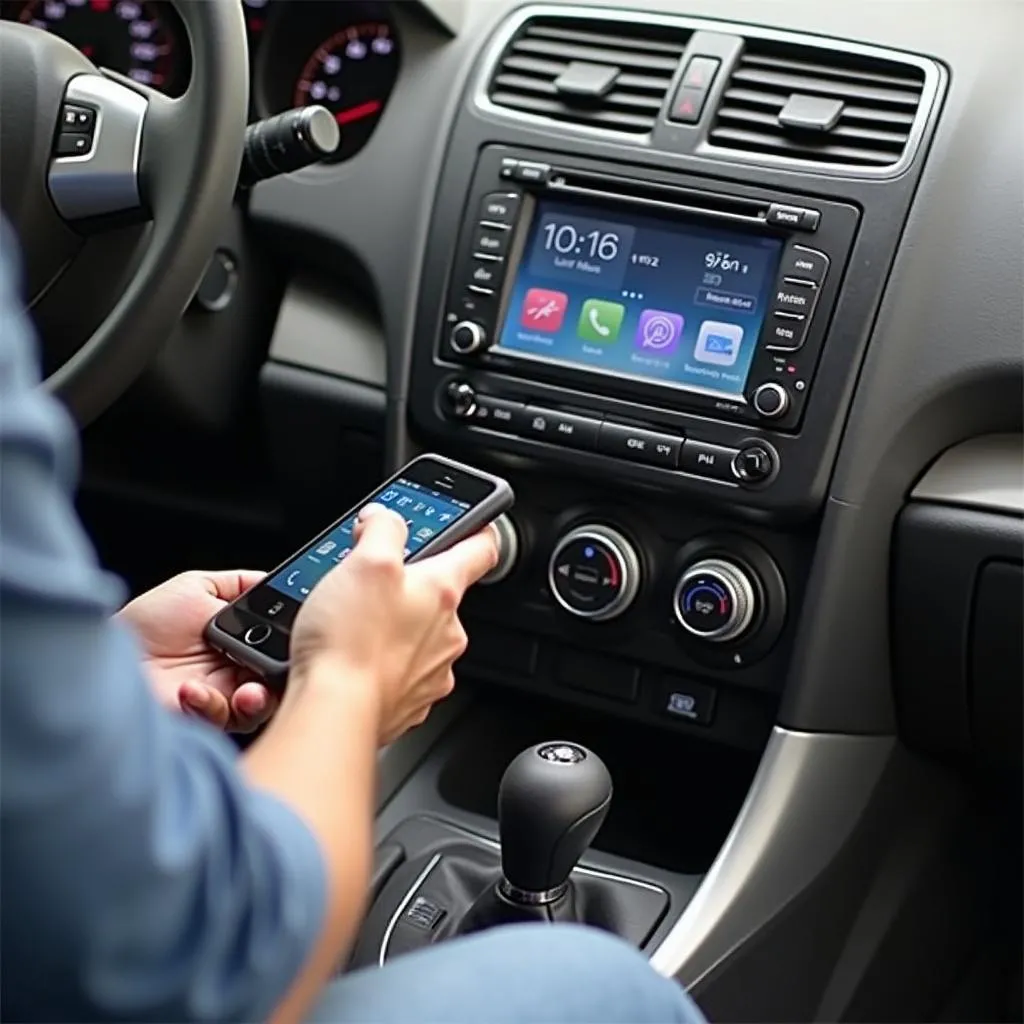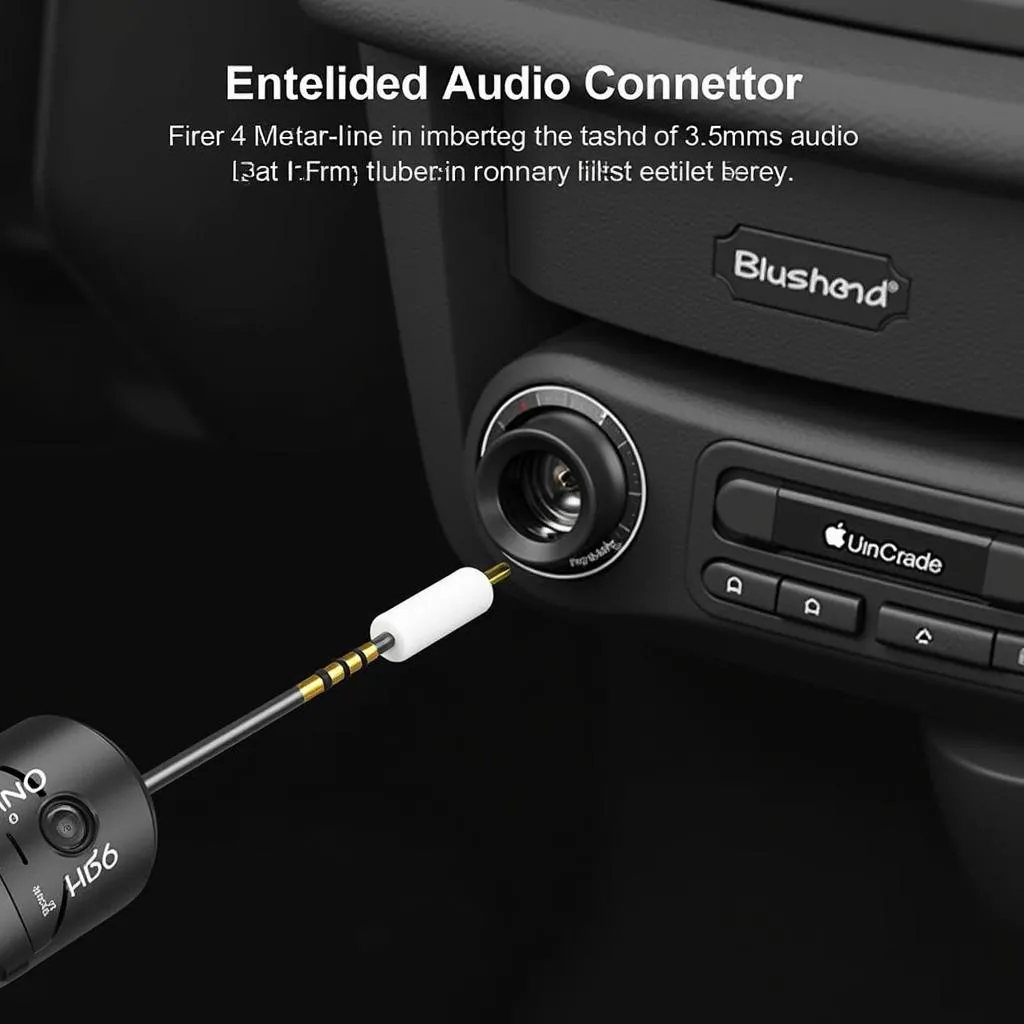“The only constant is change.” This old adage holds truer than ever in our tech-driven world, even for something as seemingly simple as your car radio. If your current car audio system lacks the convenience and safety of Bluetooth connectivity, a car radio Bluetooth converter can be the perfect solution. But with so many options available, choosing the right one and ensuring proper installation can be daunting. This comprehensive guide will cover everything you need to know about car radio Bluetooth converters, from their functionality to installation and troubleshooting.
Understanding Car Audio and Bluetooth Connectivity
Before delving into the world of Bluetooth converters, let’s understand the basics of car audio systems and the significance of Bluetooth.
Your car radio is essentially the heart of your vehicle’s entertainment and information system. It receives audio signals from various sources like radio stations, CDs, or auxiliary inputs and transmits them to your car’s speakers. Bluetooth technology enables wireless communication between devices, allowing you to stream audio from your smartphone directly to your car’s audio system without needing physical cables.
Common Car Radio Problems: Why You Might Need a Bluetooth Converter
Many vehicles, especially older models, lack built-in Bluetooth functionality, preventing you from enjoying the seamless experience of hands-free calling and wireless music streaming.
“Many of the vehicles we service at our shop have outdated audio systems that are perfectly functional but lack the modern convenience of Bluetooth,” says Michael Thompson, a seasoned automotive electrician with over 20 years of experience, “Bluetooth converters are a cost-effective solution to bridge this gap without replacing the entire system.”
Here are some common car audio limitations that a Bluetooth converter can address:
- No Built-in Bluetooth: This is the most common reason for opting for a converter. If your car radio doesn’t have Bluetooth, a converter can add this functionality.
- Limited Connectivity: Even if your car has Bluetooth, it might lack features like music streaming or support for multiple devices.
- Poor Sound Quality: Factory-installed Bluetooth systems can sometimes have subpar audio quality compared to dedicated converters.
Car Radio Bluetooth Converters: A Simple Solution for Modern Convenience
 Installing a Car Radio Bluetooth Converter
Installing a Car Radio Bluetooth Converter
A car radio Bluetooth converter acts as a bridge between your car’s audio system and your Bluetooth-enabled device, such as a smartphone or tablet. It receives audio signals wirelessly from your device via Bluetooth and transmits them to your car radio through a compatible input such as an auxiliary jack or cassette tape adapter.
Benefits of Using a Car Radio Bluetooth Converter:
- Hands-free Calling: Make and receive calls safely while driving without the need to hold your phone.
- Wireless Music Streaming: Enjoy your favorite playlists, podcasts, and audiobooks from your phone through your car speakers.
- Easy Installation: Most converters offer a plug-and-play solution, requiring minimal technical expertise for installation.
- Cost-Effective Upgrade: Bluetooth converters are significantly cheaper than replacing your entire car radio system.
Choosing the Right Car Radio Bluetooth Converter: Factors to Consider
Selecting the right Bluetooth converter for your car depends on several factors, including:
1. Types of Inputs and Outputs
Different converters use different methods to connect to your car radio and your devices. The most common types include:
- Auxiliary Input: These converters connect to your car radio’s 3.5mm AUX input, commonly found on most modern car stereos.
- Cassette Tape Adapter: For older car radios with cassette players, this type of converter mimics a cassette tape to transmit audio.
- FM Transmitter: This type transmits the audio signal over a specific FM radio frequency that you tune into on your car radio.
The best type for your car depends on the available inputs on your car radio.
2. Sound Quality and Features
Consider the following features for optimal audio performance:
- Noise Cancellation and Echo Reduction: Ensures clear call quality and reduces background noise.
- Audio Codec Support: Look for converters that support higher-quality audio codecs like aptX for richer sound.
- Multi-device Pairing: Allows you to connect multiple devices simultaneously.
3. Ease of Use and Installation
Choose a converter that offers a user-friendly interface and a straightforward installation process:
- Intuitive Controls: Look for easy-to-access buttons for answering calls, adjusting volume, and skipping tracks.
- Clear Display: A bright and easy-to-read display can enhance visibility and user experience.
- Plug-and-Play Setup: Opt for converters that require minimal setup and configuration.
Installing Your Car Radio Bluetooth Converter: A Step-by-Step Guide
While the specific installation steps may vary depending on the type of converter and your car model, here’s a general guide to help you through the process:
 Connecting the Bluetooth Converter
Connecting the Bluetooth Converter
- Identify the correct input: Locate the auxiliary input, cassette player, or determine a clear FM frequency if you’re using an FM transmitter.
- Connect the Converter: Plug the converter into your car’s chosen input.
- Power up the Converter: Most converters draw power directly from your car’s cigarette lighter or accessory port.
- Pair your Device: Turn on your device’s Bluetooth and search for the converter’s device name.
- Enjoy Wireless Connectivity: Once paired, you can start streaming music or making calls wirelessly.
Troubleshooting Common Car Radio Bluetooth Converter Issues:
While generally plug-and-play, some common issues might arise when using a car radio Bluetooth converter:
- Poor Sound Quality: Check the audio source, ensure the converter is properly connected, or try a different audio cable.
- Intermittent Connection: Ensure your device is within range, there are no obstacles causing interference, and the battery of the converter is sufficiently charged.
- Pairing Issues: Try deleting the pairing history on both your device and the converter and re-pairing them.
If you encounter persistent issues, refer to the converter’s manual or seek professional assistance.
Car Radio Bluetooth Converter FAQs:
Can I install a Bluetooth converter myself?
Yes, most car radio Bluetooth converters are designed for DIY installation. They come with instructions and require minimal tools.
What is the range of a car Bluetooth converter?
The Bluetooth range is typically around 30 feet, but obstacles like your car’s dashboard can affect this.
Can I use my car’s steering wheel controls with a Bluetooth converter?
This depends on the converter and your car model. Some advanced converters integrate with steering wheel controls.
Conclusion: Embrace the Future of Car Audio with Cardiagtech
Upgrading your car audio system doesn’t have to be a complicated or expensive endeavor. Car radio Bluetooth converters offer a convenient and cost-effective way to enjoy the benefits of wireless technology without replacing your entire system.
Are you ready to experience seamless wireless audio streaming and hands-free calling in your car? Contact CARDIAGTECH today at +1 (641) 206-8880 or email us at CARDIAGTECH[email protected] to learn more about our range of car diagnostic tools and services, including Bluetooth converter installation. Our expert technicians at our City of Orange, NJ location can help you choose the right converter and ensure a smooth and hassle-free installation process. Upgrade your ride today and enjoy the future of car audio with CARDIAGTECH!
